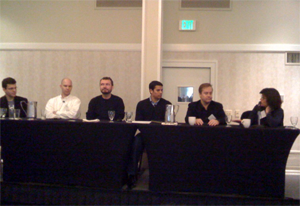
This is part two of our coverage on today’s Downturn RoundTable hosted by VentureBeat. For Part One, which details the Venture Capitalist panel, click here.
The Entrepreneurs
In a panel moderated by Kara Swisher, Toni Schneider, CEO of Automattic (the company behind WordPress), led off by saying that he wished this kind of “panicky” advice had been around for the last bubble, explaining that his startup at the time didn’t react quickly enough to stay afloat. Nirav Tolia, co-founder of epinions, added that his company had fallen prey to similar mistakes in the last bubble by investing in growth (in terms of employees and office space) before it was necessary.
Mahalo’s Jason Calacanis detailed his experience with laying off employees, saying that it should be done in one fell swoop rather than in incremental steps, which only serve to increase fear and uncertainty. He expressed how difficult it is lay people off, and urged executives to do all they can for their past employees (vesting stock whenever possible, writing letters of recommendation, etc.). He said that while CEOs may not be able to predict economic shifts, they are ultimately the ones at fault if a company has to lay off workers.
Tolia also related the cost cutting measures epinions had to undertake in the first bubble, emphasizing the importance of having someone who had “been through this sort of thing before” for advice and calling Bill Campbell (who had weathered past downturns) “a godsend”. He likened cutting costs to dieting, explaining that companies should be making “lifestyle changes” so that these problems don’t arise again instead of making cuts and then falling back into the same costly habits, only to have to downsize again in the future.
Slide CEO Max Levchin said that he has never been forced to lay off his workers, but emphasized the importance of being stingy. He attributed his frugality to his “immigrant ethic”, which he says is a great trait to have in a startup co-founder.
Paul Sieben of O’Melveny and Myers agreed with Ron Conway’s statements earlier that companies should more readily consider M&As. He also said that startups should be nimble, able to change underlying goals and start the M&A process early by forming business relationships.
When asked how helpful venture capitalists are when their portfolio companies face economic hardships, the panel had some varied (and not always positive) comments. Levchin related his experience with BlueRun Ventures (which has invested in both PayPal and Slide), saying that the VCs there have been very supportive, even when he has had to change business plans.
Toni Schnier said that Levchin has been dealing with ideal VCs, but that there are unhelpful investors who will constantly give advice (often about ideas you’ve already thought of), and that thsese are the ones who will get on your case as soon as things start looking shaky. Calacanis said that entrepreneurs tend to ask VCs for too much advice, which is a mistake, going on to say “VCs are VCs for a reason” and likening them to bankers. Calacanis also said that while the VC panel claimed it would stay open for business, they will instead form a “circle of wagons”, focusing on their winners and shutting down losers.
And while they spent a great deal of time talking about the hardships many entrepreneurs will be facing, the panel emphasized the importance of remembering why they had come to Silicon Valley in the first place: to build their dream.
Each panelist also offered some specific tips for success:
Max Levchin – Don’t listen to anyone, nobody really knows what’s going to happen next. It’s better to be contrarian in times like this than not. Just hunker down and build a company. Silicon Valley is about leveraging crazy hopes and occasionally winning.
Paul Sieben – Have backup plans.
Toni Schneider – Consider open source. It’s a great way in slow times to keep your project going – people who have time on their hands to keep your dream going.
Nirav Tolia – Over communicate.
Jason Calacanis – Focus on the product. If you’re in a plane and it’s going into a death spiral, look at your instruments (page views, members, etc.). Don’t look out the window.
Robert Scoble recorded this panel using Kyte. You can see the full recordings below:
http://www.kyte.tv/flash.swf?v=2&uri=channels/6118/258389&embedId=49344943http://media01.kyte.tv/images/updatenotice.swf
http://www.kyte.tv/flash.swf?v=2&uri=channels/6118/258443&embedId=49344946http://media01.kyte.tv/images/updatenotice.swf